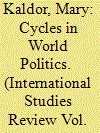| Srl | Item |
| 1 |
ID:
095935


|
|
|
|
|
| Publication |
2010.
|
| Summary/Abstract |
The existing literature that discusses China's macroeconomic volatility during the reform period does so with overwhelming reference to the business cycle. However, the business cycle is only a subset of macroeconomic volatility that occurs within a particular frequency band. In this paper we decompose various macroeconomic series by frequency and find that much volatility occurs at lower than business cycle frequencies. This suggests that it is necessary to look beyond the construct of the business cycle in order to understand the nature of China's macroeconomic volatility, and beyond the usual demand side explanations in the discussion of causes.
|
|
|
|
|
|
|
|
|
|
|
|
|
|
|
|
| 2 |
ID:
104905


|
|
|
|
|
| Publication |
2011.
|
| Summary/Abstract |
In this article, we discuss the "cycle hypothesis" in electricity generation, which states that the introduction of deregulation in an electricity system might lead to sustained fluctuations of over- and under-capacity. The occurrence of cycles is one of the major threats for electricity markets as it affects the security of supply, and creates uncertainty in both the profitability of electricity companies and in consumer prices. We discuss the background for these cycles using analogies with other capital-intensive industries, along with evidence from the analysis of behavioral simulation models as well as from experimental electricity markets. Using data from the oldest deregulated markets we find support for the hypothesis in the case of the English and Chilean markets, based on an autocorrelation analysis. Evidence from the Nordpool market is more ambiguous, although we might be observing the first half of a cycle in generation capacity. Comparing a simulation of the English market performed in 1992 with the actual performance we can observe that the qualitative behavior of the model is consistent with the actual evolution. Finally, we discuss possible mechanisms for damping cycles in electricity generation, such as mothballing, capacity payments, and reliability markets.
|
|
|
|
|
|
|
|
|
|
|
|
|
|
|
|
| 3 |
ID:
160052


|
|
|
|
|
| Summary/Abstract |
This article argues that we are living through a period when political institutions are out of step with dramatic, economic and social changes. In similar periods in the past, war has often played a key restructuring role. But contemporary wars are much less likely to achieve this. The main agents of change are social movements and new forms of communication. The article concludes that we need new forms of global governance and some critical rethinking of academic discipline.
|
|
|
|
|
|
|
|
|
|
|
|
|
|
|
|